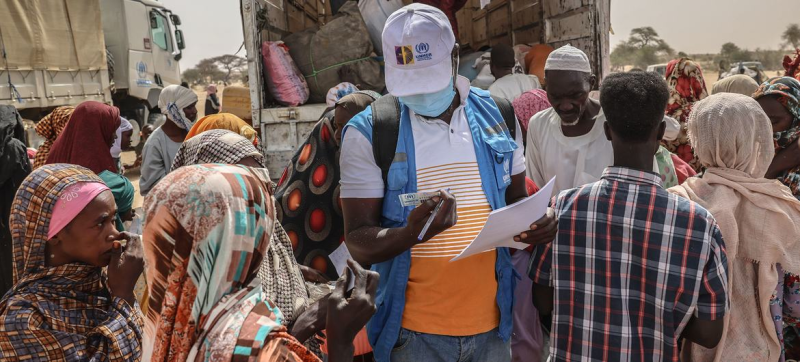- India Sees 9% Drop in Foreign Tourists as Bangladesh Visits Plunge |
- Dhaka Urges Restraint in Pakistan-Afghan War |
- Guterres Urges Action on Safe Migration Pact |
- OpenAI Raises $110B in Amazon-Led Funding |
- Puppet show enchants Children as Boi Mela comes alive on day 2 |
Sudan violence drives 1.2M refugees to Chad, crisis deepens

UNHCR/Caitlin Kelly Chad. Rapid Influx of Sudanese refugees leaves thousands in desperate need
The number of Sudanese refugees in Chad has more than tripled in just over two years amid ongoing conflict in Sudan, the UN refugee agency UNHCR said in an alert on Tuesday.
Currently, around 1.2 million Sudanese have sought shelter in eastern Chad, mostly fleeing escalating violence in their homeland. Since the war erupted in Sudan in April 2023, over 844,000 refugees have crossed into Chad. Before this recent influx, Chad was already hosting approximately 409,000 Sudanese refugees displaced by earlier conflict in Darfur.
The situation is “a crisis of humanity,” said UNHCR’s Principal Situation Coordinator in Chad, Dossou Patrice Ahouansou.
The latest displacement wave began after armed group attacks in North Darfur. Since April 2023, violence between the Sudanese Armed Forces (SAF) and the paramilitary Rapid Support Forces (RSF) has intensified.
Camps hosting those uprooted by the recent violence, including Zamzam and Abu Shouk, along with the town of El Fasher, have been attacked, resulting in over 300 civilian deaths.
Last Thursday, the UN World Food Programme’s facility in El Fasher was repeatedly shelled, according to a UN aid coordination office (OCHA) report. The following day, Eldaman International Hospital in Al Obeid suffered a drone strike that killed at least six health workers and injured more than 15 others. Both attacks were reportedly carried out by the RSF.
In just over a month, 68,556 refugees have crossed into Chad’s Wadi Fira and Ennedi Est provinces, averaging 1,400 arrivals daily.
More than 70% of these refugees report serious human rights abuses — including physical and sexual violence, arbitrary detention, and forced recruitment, said Mr. Ahouansou. Interviews with 6,810 newly arrived refugees revealed that six in ten were separated from family members.
Mr. Ahouansou recounted the story of seven-year-old Hawa, whose family home in Zamzam was bombed. After her mother was killed, she fled to the Zamzam camp for internally displaced people. Subsequent bombings killed her father and two brothers. Now, with only her 18-year-old sister left, Hawa escaped to Chad severely injured and requiring leg amputation.
“It’s difficult to hear, but this is the reality,” said Mr. Ahouansou, highlighting that thousands face similar horrors.
He also described forced labour along the perilous journey, where many die due to heat and dehydration. “When armed groups see you leaving, they let the donkey or horse go, but you as a human are forced to carry your family,” he said.
Despite efforts by humanitarian actors and local authorities, emergency response remains critically underfunded. Only 14% of shelter needs have been met, and refugees receive just five litres of water daily — far below the 15–20 litre international standard. Approximately 239,000 refugees remain stranded at the border.
“The lives and futures of millions of innocent civilians hang in the balance,” said UNHCR spokesperson Eujin Byun, stressing that this is also a “crisis of women and children,” who comprise up to nine in ten refugees crossing the border.
“Without a significant increase in funding, life-saving assistance cannot be delivered at the scale and speed required,” warned Mr. Ahouansou.

